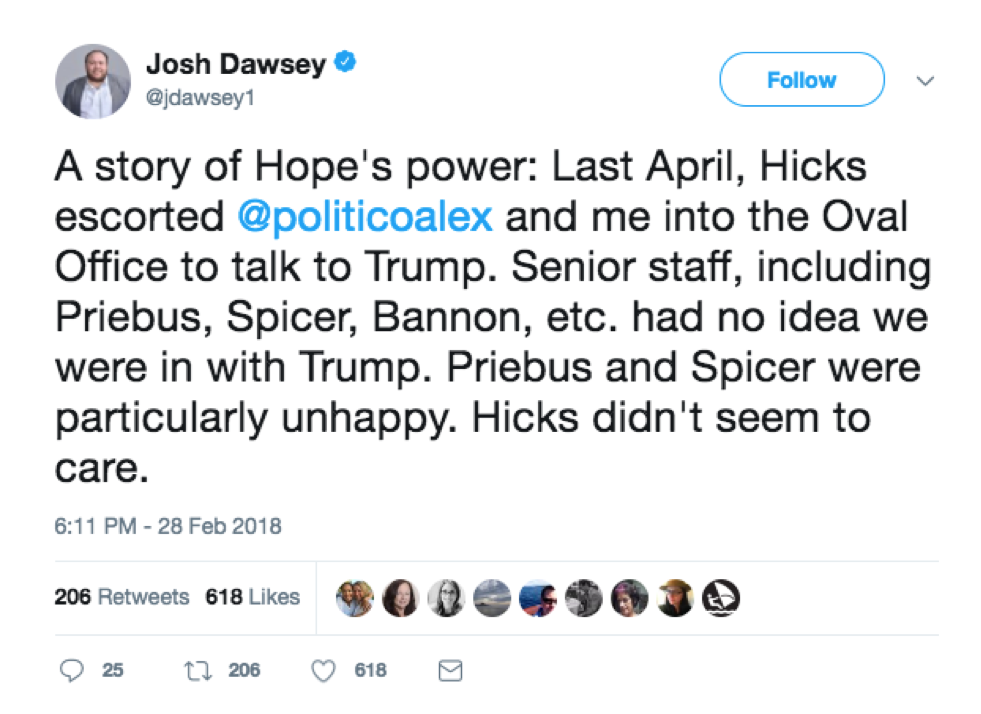US - #WeeklyAddress: February 26 - March 4: With Hope Hicks out, what's next for Trump's relationship with the press?
Below are the most notable incidents regarding threats to press freedom in the US during the week of February 26 - March 4:
White House Communications Director Hope Hicks resigned on February 28, a day after she testified before the House Intelligence Committee and admitted to telling “white lies” for President Trump during her closed-door testimony on February 27 with the House Intelligence Committee as part of the panel's Russia investigation. Hicks was one of Trump’s closest advisers and acted as a major point-of-contact for journalists seeking meetings with him, often arranging interviews without consulting the rest of the White House press operation. Washington Post reporter Josh Dawsey and Bloomberg reporter Josh Green recounted on Twitter situations when Hicks went behind-the-scenes to help them schedule interviews with Trump. Dawsey tweeted insight into his relationship with Hicks on February 28.

With all of the changes to the White House’s communications team since Trump was elected President, the relationship between each Press Secretary and the press pool, particularly during briefings, has been tumultuous and overtly hostile. Most recently, Sarah Huckabee Sanders stated that the media “put[s] national security at risk.”
Producer claims E! fired her for releasing a clip criticizing the network
E! Producer Aileen Gram-Moreno claimed she was fired for failing to censor an interview during this year’s Golden Globes red carpet event in which actress Eva Longoria criticized the network’s treatment of former “E! News” host Catt Sadler. The former host left the channel after she discovered that she was making significantly less money than her male counterpart, Jason Kennedy. Gram-Moreno filed a complaint with the Employment Opportunity Commission on March 2, alleging she was instructed to flag any mention of Sadler, Time’s Up, or #MeToo before any of the interviews she conducted went on air. Because of the high volume of interviews being recorded, she argues she was unable to fully review each interview — including Longoria’s — prior to it being approved for airing. Adam Stotsky, president of E! Entertainment, stated that the network did not try to censor any of the interviews and that he let go of Gram-Moreno due to a “pattern of poor performance.” Yet Gram-Moreno’s attorney Katherine Atkinson responded to Stotsky’s remarks claiming the network never once mentioned their disapproval toward her performance in her 12 years at E!, and described her dismissal as “a convenient excuse for covering up attempts to silence women speaking out.” This come months after reports on sexual harassment and the #MeToo movement have revealed the lengths to which powerful accused figures will go to silence the stories of women reporting abuse to media outlets, through the use of legal pressure, powerful public relations teams, and the individual harassment of sources and journalists.
Nevada Supreme Court overturns ruling that violated two media outlets’ First Amendment rights while reporting on victims of Las Vegas shooting
On February 27, Nevada Supreme Court Justice Kristina Pickering overturned a district court ruling that ordered the Las Vegas Review-Journal and Associated Press (AP) to destroy or return to police their copies of an October 2017 Las Vegas shooting victim’s autopsy report on the ground that it violated the First Amendment. District Court Judge Richard Scotti’s February 9 ruling, in favor of the wife of slain police officer Charles Hartfield, ordered Las Vegas Review-Journal and AP to destroy and refrain from publishing any details from their copies of the victim’s autopsy report. This is one of 58 autopsy reports released in January on the victims from the Las Vegas mass shooting, which both news outlets had sued to acquire. Because none of these reports included identifying details other than the victims’ gender, the news outlets could not find Hartfield’s report to destroy after Scotti’s ruling. Scotti suggested they allow government employees into their newsrooms to go through their records in order to find and destroy Hartfield’s reports.
Review-Journal Managing Editor Glenn Cook told the Freedom of the Press Foundation: “If anywhere in this country, agents of any government entity were allowed to force their way into a newsroom to rifle through documents and seek out a specific record and destroy it, it would be an unparalleled violation of the press freedoms enshrined in the First Amendment.”
The United States ranks 43rd out of 180 countries in RSF's 2017 World Press Freedom Index after falling 2 places in the last year.
For the latest updates, follow RSF on twitter @RSF_en.



